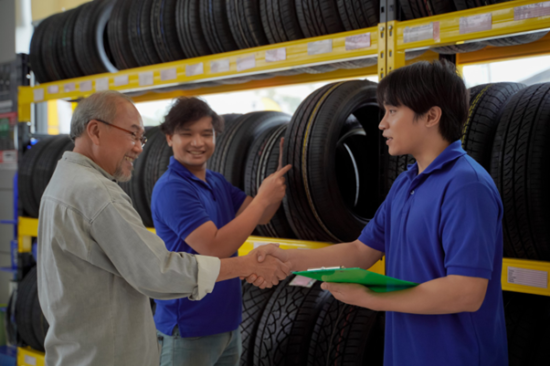The benefits of multilingualism in the tyre and wheel business
 (Photo: Freepik)
(Photo: Freepik)
The transport industry is constantly evolving to meet the changing needs of businesses and consumers around the world. Technological advancements in areas like automation, electric vehicles, and data analytics are transforming the way we move goods and people, while global trade and e-commerce continue to drive demand for transportation services. The COVID-19 pandemic has also had a significant impact on the industry, leading to disruptions in supply chains and changes in consumer behaviour. Despite these challenges, the transport industry remains a vital component of the global economy, connecting businesses and individuals across borders and driving economic growth.
Multilingualism has become an even more valuable skill in this industry. In fact, the benefits of multilingualism in this field are particularly significant, given the global nature of the industry and the importance of communication with clients, suppliers, and partners from around the world. In this article, we’ll explore some of the key benefits of multilingualism in the tyre and wheel industry and some tips for developing your language skills.
Improved communication with clients and suppliers
The tyre and wheel industry is an international business, with companies operating on a global scale. Being able to communicate effectively with clients and suppliers in their native language is essential for building strong relationships and conducting successful business. Speaking a client’s language can help to establish rapport and trust, as well as improve communication accuracy and speed. In addition, being able to read and understand documents in multiple languages can help to avoid misunderstandings and mistakes.
Increased access to new markets
Multilingual employees in the tyre and wheel industry can help their companies to access new markets and expand their customer base. Knowing the languages of potential clients and partners can help companies to establish relationships more easily and effectively and to understand the cultural nuances of different regions better.
This can be particularly valuable when it comes to negotiating contracts, as speaking the same language can help to avoid misunderstandings and improve the chances of a successful agreement.
Improved safety and compliance
Safety is a top priority in the tyre and wheel industry, and multilingual employees can play an important role in ensuring compliance with safety regulations and standards. Being able to read and understand technical documents and safety guidelines in multiple languages can help to ensure that these standards are met and that workers are kept safe.
In addition, multilingual employees can help to ensure that safety protocols are understood and followed by workers from diverse backgrounds.
(Photo: Freepik)
Increased innovation and creativity
Multilingualism has been linked to increased creativity and innovation, which can be particularly valuable in the tire and wheel industry. In a field that is constantly evolving and facing new challenges, employees with diverse language skills can bring fresh perspectives and ideas to the table.
Multilingual employees may be better able to think outside the box and come up with creative solutions to problems, particularly when working with clients or suppliers from different cultural backgrounds.
Improved personal and professional development
Learning a new language is not just beneficial for the workplace but can also be personally and professionally rewarding. Multilingual employees in the tire and wheel industry can improve their own cultural competence and gain a better understanding of other cultures, which can help to improve communication and collaboration with colleagues and clients from diverse backgrounds.
In addition, learning a new language can be a valuable addition to a CV or resume and can open up new career opportunities in the future.
Tips for developing your language skills
If you’re interested in developing your language skills for the tyre and wheel industry, there are a few tips that can help you get started:
- Take a class: Enrolling in a language class is a great way to learn a new language in a structured and supportive environment. Many community colleges and language schools offer courses in various languages, so you can find one that fits your needs and schedule.
- Use language-learning apps: There are many language-learning apps available for smartphones and tablets, which can be a convenient and flexible way to learn on the go. For example, Promova is an app that offers interactive lessons and exercises to help learners improve their language skills.
- Immerse yourself in the language: Immersing yourself in the language you’re learning is one of the most effective ways to improve your skills. This could mean watching TV shows or movies in the target language, listening to podcasts or music, or practicing conversation with native speakers.
- Practice regularly: Consistent practice is key to developing language skills. Set aside time each day to study and practice, and try to incorporate the language into your daily life as much as possible. This could mean labelling household items with their foreign language equivalents or setting your phone or computer to display in the language you’re learning.
- Find a language exchange partner: One of the best ways to improve your speaking and listening skills is to practice with a native speaker. You can find language exchange partners online through sites like ConversationExchange.com or Tandemа or through local language exchange groups.
In conclusion, multilingualism is a valuable skill for anyone working in the tyre and wheel industry. Improved communication with clients and suppliers, increased access to new markets, improved safety and compliance, increased innovation and creativity, and improved personal and professional development are just a few of the benefits of being able to speak multiple languages in this field.
By following some of the tips outlined above, you can begin developing your own language skills and become a more valuable employee in the tire and wheel industry.



 Linglong
Linglong Alldata Europe
Alldata Europe
Comments